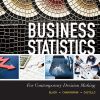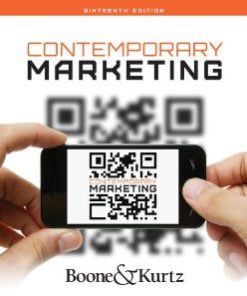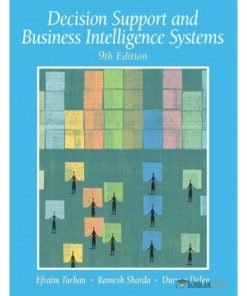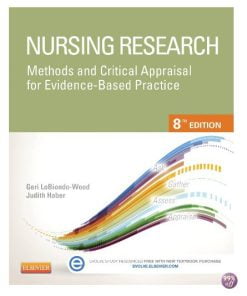Test Bank for Government in America 17th Edition
$35.00 Original price was: $35.00.$26.50Current price is: $26.50.
Test Bank for Government in America 17th Edition
This is completed downloadable Test Bank for Government in America 17th Edition.
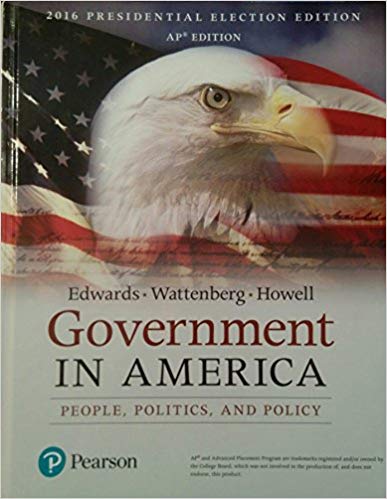
Instant download Test Bank for Government in America 17th Edition pdf docx epub after payment.
Product Details:
- ISBN-10 : 0134586573
- ISBN-13 : 978-0134586571
- Author; Edwards; Howell
This is the eBook of the printed book and may not include any media, website access codes, or print supplements that may come packaged with the bound book. For courses in American Government Learn how American politics affects public policy Revel™ Government in America: People, Politics, and Policy takes a public-policy approach to show how politics influences the policies that governments produce. Authors George Edwards, Martin Wattenberg, and William Howell provide a framework for students to understand the difficult questions that decision makers of both political parties are facing: how should we govern and what should government do? By emphasizing the scope of government — the key issue in American politics today — the authors help students see how politics matters in their own lives. The 2018 Elections and Updates Edition offers new narrative coverage of the major issues from today’s headlines including the 2018 midterm elections, recent policy under the Trump administration, and the nomination of Brett Kavanaugh to the Supreme Court. Revel is Pearson’s newest way of delivering our respected content. Fully digital and highly engaging, Revel replaces the textbook and gives students everything they need for the course. Informed by extensive research on how people read, think, and learn, Revel is an interactive learning environment that enables students to read, practice, and study in one continuous experience — for less than the cost of a traditional textbook. NOTE: Revel is a fully digital delivery of Pearson content. This ISBN is for the standalone Revel access card. Before purchasing, check with your instructor to confirm the correct ISBN. Revel access is title-specific and edition-specific and is not transferable. In addition to this access card, you will need a course invite link, provided by your instructor, to register for and use Revel.
Table Of Contents:
- Contents
- To the Student
- Meet Your Authors
- To the Instructor
- Part I Constitutional Foundations
- Chapter 1 Introducing Government in America
- Chapter Outline and Learning Objectives
- Government
- Politics
- The Policymaking System
- People Shape Policy
- Policies Impact People
- Democracy in America
- Traditional Democratic Theory
- Three Contemporary Theories of American Democracy
- Pluralism
- Elitism
- Hyperpluralism
- Challenges to Democracy
- Weakening of Democratic Norms
- Increased Complexity of Issues
- Limited Participation in Government
- Escalating Campaign Costs
- Diverse Political Interests
- American Political Culture and Democracy
- Liberty
- Individualism
- Laissez-faire
- Populism
- Egalitarianism
- The Scope of Government in America
- How Active Is American Government?
- Chapter 1 Review the Chapter
- Government
- Politics
- The Policymaking System
- Democracy In America
- The Scope of Government in America
- Learn the Terms
- Explore Further
- Chapter 2 The Constitution
- Chapter Outline and Learning Objectives
- The Origins of the Constitution
- The Road to Revolution
- Declaring Independence
- The English Heritage: The Power of Ideas
- The American Creed
- Winning Independence
- The “Conservative” Revolution
- The Government That Failed: 1776–1787
- The Articles of Confederation
- Changes in the States
- Economic Turmoil
- The Aborted Annapolis Meeting
- Writing a Constitution: The Philadelphia Convention
- Gentlemen in Philadelphia
- Philosophy into Action
- Human Nature
- Political Conflict
- Purpose of Government
- Nature of Government
- Critical Issues at the Convention
- The Equality Issues
- Representation of the States
- Slavery
- Equality in Voting
- The Economic Issues
- The Individual Rights Issues
- The Madisonian System
- Thwarting the Tyranny of the Majority
- Limiting Majority Control
- Separating Powers
- Creating Checks and Balances
- Establishing a Federal System
- The Constitutional Republic
- The End of the Beginning
- Ratifying the Constitution
- Federalists and Anti-Federalists
- Ratification
- Changing the Constitution
- The Formal Amending Process
- The Informal Processes of Constitutional Change
- Judicial Interpretation
- Changing Political Practice
- Technology
- Increased Demands for New Policies
- The Importance of Flexibility
- Understanding the Constitution
- The Constitution and Democracy
- The Constitution and the Scope of Government
- Chapter 2 Review the Chapter
- The Origins of the Constitution
- The Government That Failed: 1776–1787
- Making a Constitution: The Philadelphia Convention
- Critical Issues at the Convention
- The Madisonian System
- Ratifying the Constitution
- Changing the Constitution
- Understanding the Constitution
- Learn the Terms
- Explore Further
- Chapter 3 Federalism
- Chapter Outline and Learning Objectives
- Defining Federalism
- Why Federalism?
- The Constitutional Basis of Federalism
- The Division of Power
- National Supremacy
- The Civil War
- The Struggle for Racial Equality
- The Tenth Amendment
- The Eleventh Amendment
- Implied Powers
- Commerce Power
- States’ Obligations to Each Other
- Full Faith and Credit
- Extradition
- Privileges and Immunities
- Intergovernmental Relations
- From Dual to Cooperative Federalism
- Devolution?
- Fiscal Federalism
- The Grant System
- The Scramble for Federal Dollars
- The Mandate Blues
- Diversity in Policy
- Understanding Federalism
- Federalism and Democracy
- Decentralizes Politics
- Reduces Conflict
- Allows Diversity of Policy
- Increases Opportunities to Participate
- Increases Access to Government
- Increases Acceptability of Losing
- Allows Losers to Win
- Allows Local Interests to Thwart National Majorities
- Burdens and Confuses Citizens
- Federalism and the Scope of the National Government
- Chapter 3 Review the Chapter
- Defining Federalism
- Why Federalism?
- The Constitutional Basis of Federalism
- Intergovernmental Relations
- Diversity in Policy
- Understanding Federalism
- Learn the Terms
- Explore Further
- Chapter 4 Civil Liberties and Public Policy
- Chapter Outline and Learning Objectives
- The Bill of Rights
- The Bill of Rights—Then and Now
- The Bill of Rights and the States
- Freedom of Religion
- The Establishment Clause
- Education
- Religious Activities in Public Schools
- School Prayer
- Evolution
- Public Displays
- The Free Exercise Clause
- Freedom of Expression
- Prior Restraint
- Free Speech and Public Order
- Obscenity
- Libel and Slander
- Symbolic Speech
- Compelled Speech
- Free Press and Fair Trials
- Commercial Speech
- Regulation of the Public Airwaves and Cyberspace
- Campaign Spending
- Freedom of Assembly
- Right to Assemble
- Right to Associate
- Right to Bear Arms
- Defendants’ Rights
- Searches and Seizures
- The War on Terrorism
- Self-Incrimination
- The Right to Counsel
- Trials
- Plea Bargains
- Speedy Trial
- Impartial Jury
- Confront Witnesses
- Know Evidence
- Detentions and the War on Terrorism
- Cruel and Unusual Punishment
- The Right to Privacy
- Is There a Right to Privacy?
- Controversy over Abortion
- Understanding Civil Liberties
- Civil Liberties and Democracy
- Civil Liberties and the Scope of Government
- Chapter 4 Review the Chapter
- The Bill of Rights
- Freedom of Religion
- Freedom of Expression
- Freedom of Assembly
- Right to Bear Arms
- Defendants’ Rights
- The Right to Privacy
- Understanding Civil Liberties
- Learn the Terms
- Key Cases
- Explore Further
- Chapter 5 Civil Rights and Public Policy
- Chapter Outline and Learning Objectives
- The Struggle for Equality
- Conceptions of Equality
- The Constitution and Inequality
- African Americans’ Civil Rights
- Slavery
- Reconstruction and Segregation
- Equal Education
- The Civil Rights Movement and Public Policy
- Voting Rights
- The Rights of Other Minority Groups
- Native Americans
- Hispanic Americans
- Asian Americans
- Arab Americans and Muslims
- The Rights of Women
- The Battle for the Vote
- The “Doldrums”: 1920–1960
- The Second Feminist Wave
- Women in the Workplace
- Wage Discrimination and Comparable Worth
- Employment
- Education
- Military Service
- Sexual Harassment
- Other Groups Active Under the Civil Rights Umbrella
- Civil Rights and the Graying of America
- Civil Rights and People with Disabilities
People also search:
what political system does the us use
government in america 17th edition pdf
how did the 17th amendment change america
Government in America 17th Edition pdf
Related products
Test Bank
Test Bank for Decision Support and Business Intelligence Systems, 9th Edition: Efraim Turban


